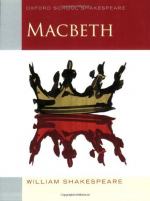|
This section contains 1,794 words (approx. 5 pages at 400 words per page) |

|
[Driver proposes that Macbeth contains three kinds of time: chronological time, providential time, and Macbeth's time. The critic notes that at a literal level, frequent references to chronological time serve to establish the concrete reality of time in the play. Driver describes providential time as "an expression of social and universal righteousness," a natural order which is initially displaced by Macbeth s evil actions, but which gradually overwhelms the protagonist and re-establishes its position in the universe. Opposed to providential time, the critic contend. is Macbeth's view of time, in which he futilely attempts to control the future by separating itfrom the past Macbeth ultimately acknowledges his inability to reconcile these two elements of time, the critic concludes. by realizing in his soliloquy in Act V, scene v, that "the mortality of time is followed by. . . man s mortality. "]
In Macbeth there are three kinds of time...
|
This section contains 1,794 words (approx. 5 pages at 400 words per page) |

|




